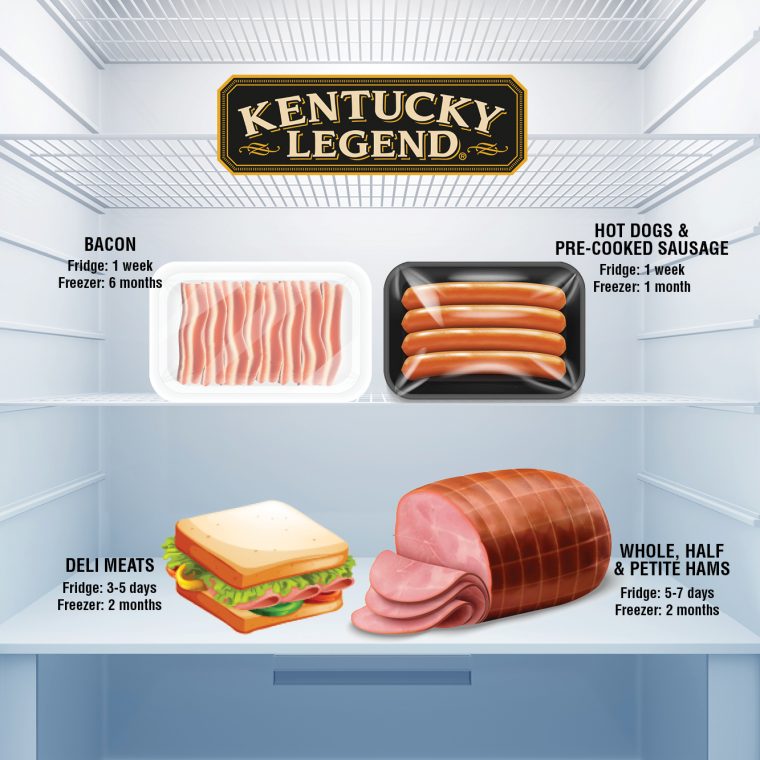How Long Does Deli Meat Last? Unwrap the Secrets!

Deli meat lasts 3-5 days when stored in the refrigerator at or below 40°F (4°C), maintaining its quality and safety for this duration.
It is important to note that the precise shelf life may vary depending on the type of deli meat and its packaging. Freshly sliced deli meat is a popular choice for sandwiches, salads, and charcuterie boards. However, it’s crucial to understand how long deli meat can last before it starts to spoil.
Proper storage and handling play a significant role in determining its shelf life. We will delve into the factors that affect the lifespan of deli meat, how to store it correctly, and signs to look for when it’s time to discard it. By following these guidelines, you can ensure the safety and quality of your deli meat, allowing you to enjoy it to the fullest. So, let’s get started and learn more about the shelf life of deli meat.
Shelf Life Essentials
Deli meat is a popular food item in many households. It is a versatile ingredient that can be used in sandwiches, salads, and even as a snack. However, it is important to pay attention to the shelf life of deli meat to ensure that it is safe to eat. In this article, we will discuss the shelf life of deli meat and the types of deli meat that are available.
Types Of Deli Meat
There are several types of deli meat available, including:
| Type of Deli Meat | Description |
|---|---|
| Ham | Ham is a type of pork that is cured and often smoked. It is available in many different varieties, including black forest ham, honey ham, and Virginia ham. |
| Turkey | Turkey is a lean meat that is a popular alternative to ham. It is available in many different varieties, including smoked turkey, honey turkey, and oven-roasted turkey. |
| Roast Beef | Roast beef is a type of beef that is roasted and then sliced thin. It is often used in sandwiches and salads. |
| Salami | Salami is a type of cured sausage that is often made from beef or pork. It is available in many different varieties, including genoa salami, pepperoni, and hard salami. |
Expiration Date Vs. Best By
When it comes to deli meat, it is important to pay attention to the expiration date and the best by date. The expiration date is the date by which the deli meat must be consumed, while the best by date is the date by which the deli meat will be at its best quality. It is important to note that deli meat can still be safe to eat after the best by date, but the quality may not be as good.
In conclusion, deli meat is a popular food item that can be used in many different ways. However, it is important to pay attention to the shelf life of deli meat to ensure that it is safe to eat. By following the guidelines above, you can ensure that you are consuming deli meat that is both safe and of good quality.
Storage Solutions
Properly storing deli meat is essential to ensure its freshness and safety for consumption. By following these storage solutions, you can maximize the shelf life of your deli meats.
Refrigeration Tips
- Keep deli meat in the coldest part of the refrigerator (around 32°F to 38°F).
- Store opened deli meat in airtight containers or resealable bags.
- Avoid storing deli meat in the refrigerator door to maintain a consistent temperature.
Freezing And Its Impact
- Wrap deli meat tightly in plastic wrap or aluminum foil before placing it in the freezer.
- Freezing can extend the shelf life of deli meat but may alter its texture slightly.
- Consume frozen deli meat within 1-2 months for the best quality.
Signs Of Spoilage
How Long Does Deli Meat Last? Deli meat can last around 3-5 days in the refrigerator. Signs of spoilage include a sour smell, slimy texture, or unusual coloration. It’s crucial to store deli meats properly to maintain their freshness and flavor.
When it comes to deli meat, it’s important to know when it has gone bad. Consuming spoiled deli meat can lead to foodborne illnesses and unpleasant experiences. Fortunately, there are several signs to look out for to determine if your deli meat has spoiled. By paying attention to visual clues, odor, and texture changes, you can ensure that the deli meat you are about to consume is safe and fresh.
Visual Clues
Visual clues can be a reliable indicator of whether your deli meat has spoiled. Inspect the meat for any noticeable changes in color, such as a grayish or greenish hue. Additionally, if you observe any mold growth on the surface of the deli meat, it is a clear sign of spoilage. Mold can produce harmful toxins that can lead to food poisoning. It is essential to remember that while some molds are harmless, others can be dangerous to consume. Therefore, it is best to discard any deli meat with visible mold growth.
Odor And Texture Changes
The smell and texture of deli meat can also provide valuable insights into its freshness. Fresh deli meat typically has a neutral or slightly salty aroma. However, if you notice a sour, rotten, or pungent odor coming from the meat, it is a strong indication of spoilage. In terms of texture, fresh deli meat should have a moist and firm consistency. If the meat feels slimy, sticky, or excessively dry, it has likely deteriorated. These changes in odor and texture are clear indications that the deli meat has passed its prime and should be discarded.
In conclusion, being able to recognize the signs of spoilage in deli meat is crucial for ensuring food safety. By paying attention to visual clues, such as color and mold growth, as well as changes in odor and texture, you can make informed decisions about the freshness of your deli meat. Remember, when in doubt, it is always better to err on the side of caution and discard any meat that appears spoiled. Your health and well-being are worth the extra precaution.

Credit: www.unipatch.com
Health Risks
Deli meat can last for about 3-5 days in the refrigerator. Consuming expired deli meat can pose health risks like food poisoning. Always check the expiration date and store it properly to avoid any potential health issues.
Deli meat is a popular and convenient food choice for many people. However, it is important to be aware of the potential health risks associated with consuming deli meat that has gone bad.
Food Poisoning Symptoms
Consuming deli meat that has gone bad can cause food poisoning. The symptoms of food poisoning include nausea, vomiting, diarrhea, stomach cramps, and fever. These symptoms can range from mild to severe and can last for several days. It is important to seek medical attention if you experience any of these symptoms after consuming deli meat.
Preventing Cross-contamination
Cross-contamination is a common cause of food poisoning. To prevent cross-contamination, it is important to keep raw meat separate from cooked meat and ready-to-eat foods such as deli meat. Use separate cutting boards and utensils for raw and cooked meats, and always wash your hands thoroughly after handling raw meat.
To ensure the safety of your deli meat, it is important to follow the recommended storage guidelines. Deli meat should be stored in the refrigerator at a temperature of 40°F or below and should be consumed within 3-5 days of purchase. If the deli meat has an off smell, slimy texture, or appears to be discolored, it should be discarded immediately. In conclusion, being aware of the potential health risks associated with deli meat and taking the necessary precautions can help prevent food poisoning and ensure the safety of your food.
Maximizing Freshness
Proper Packaging
Store deli meat in airtight containers to keep it fresh longer.
Controlling Humidity
Maintain proper humidity levels in the refrigerator to prevent deli meat from drying out.
Deli Meat Varieties
When it comes to deli meats, there are a wide variety of options to choose from. Whether you prefer the classic favorites or are looking to try something new, understanding the differences between processed and unprocessed deli meats can help you make an informed decision. Additionally, knowing how the type of deli meat impacts its longevity can ensure that you enjoy your sandwich without any concerns.
Processed Vs. Unprocessed
Processed deli meats, such as bologna, salami, and ham, undergo various treatments to extend their shelf life. These treatments often involve curing, smoking, or adding preservatives to the meat. On the other hand, unprocessed deli meats, like roast beef, turkey breast, and chicken, are typically cooked or roasted without any additional curing or smoking processes.
Impact On Longevity
The processing methods used for deli meats can significantly impact their longevity. Processed deli meats tend to have a longer shelf life due to the addition of preservatives. These preservatives help inhibit the growth of bacteria, extending the meat’s freshness. Unprocessed deli meats, however, have a shorter shelf life as they lack these added preservatives. It’s important to note that unprocessed deli meats still have a limited shelf life and should be consumed within a few days of purchase.
To provide you with a clearer understanding, here’s a comparison table between processed and unprocessed deli meats:
| Deli Meat Type | Processing Method | Shelf Life (Refrigerated) |
|---|---|---|
| Bologna | Cured, smoked, and seasoned | 1-2 weeks |
| Roast Beef | Cooked or roasted | 3-4 days |
| Salami | Cured, smoked, and seasoned | 2-3 weeks |
| Turkey Breast | Cooked or roasted | 3-5 days |
| Ham | Cured, smoked, and seasoned | 1-2 weeks |
| Chicken | Cooked or roasted | 2-3 days |
Remember, these timeframes are approximate and can vary depending on various factors such as storage conditions and the freshness of the deli meat when purchased. It’s always recommended to check the “use-by” or “best-by” date on the packaging and consume the deli meat within that timeframe for optimal freshness and safety.
Consumption Tips
When it comes to consuming deli meat, there are some essential tips to keep in mind:
Serving Suggestions
- Pair deli meat with fresh bread and cheese for a classic sandwich.
- Top a salad with sliced deli meat for added protein and flavor.
Creative Uses Before Expiry
- Create a charcuterie board with an assortment of deli meats.
- Add chopped deli meat to omelets or pasta dishes for a savory twist.

Credit: www.youtube.com
Faqs Unveiled
Deli meat typically lasts for about 3-5 days when stored properly in the refrigerator. It is important to check for any signs of spoilage before consuming.
Deli meat is a popular choice for quick and easy meals, but many people are unsure about its shelf life. Let’s uncover some common questions surrounding the longevity of deli meat.
Myths About Deli Meat
Some believe deli meat lasts forever, but in reality, it has a limited shelf life. Storing it properly is key.
Expert Advice On Shelf Life
– Store deli meat in the fridge at 40°F or below – Use within 3-5 days of opening – Freeze for longer shelf life up to 2 months Remember, following these guidelines ensures the safety and quality of your deli meat.
Frequently Asked Questions
How Long Is Deli Meat Safe To Eat?
Deli meat is typically safe to eat for 3 to 5 days when stored properly in the refrigerator. It is important to check the expiration date and look for any signs of spoilage before consuming.
Can You Freeze Deli Meat For Later Use?
Yes, you can freeze deli meat for future use. Ensure it is tightly sealed to prevent freezer burn. When properly stored, frozen deli meat can last for up to 2 months without compromising its quality.
What Are The Signs That Deli Meat Has Gone Bad?
Signs of spoiled deli meat include an off smell, slimy texture, or discoloration. If you notice any of these, it’s best to discard the meat to avoid the risk of foodborne illness. Always prioritize food safety.
How Should Deli Meat Be Stored In The Refrigerator?
Store deli meat in the coldest part of the refrigerator, preferably in the deli drawer or in a tightly sealed container. This helps maintain its freshness and prevents the growth of harmful bacteria, ensuring its safety for consumption.
Conclusion
Understanding the shelf life of deli meat is essential for food safety. By following proper storage guidelines, you can ensure the freshness and quality of your deli meat. Remember to check for any signs of spoilage before consuming, and always prioritize food safety in your kitchen.





